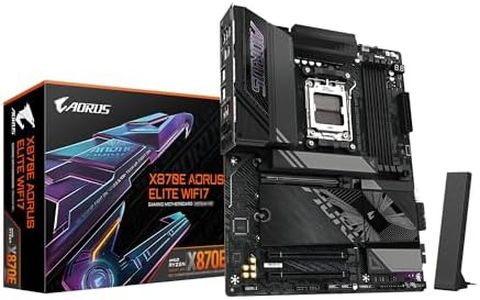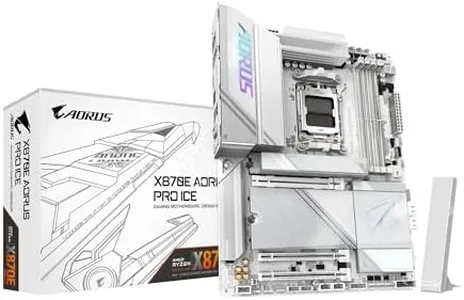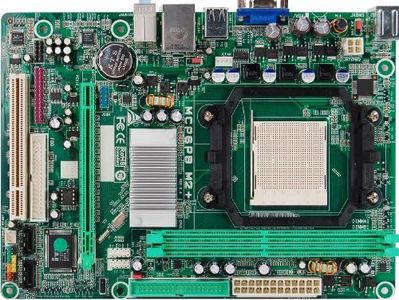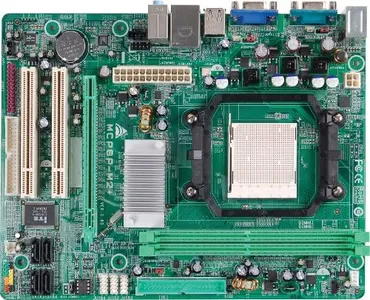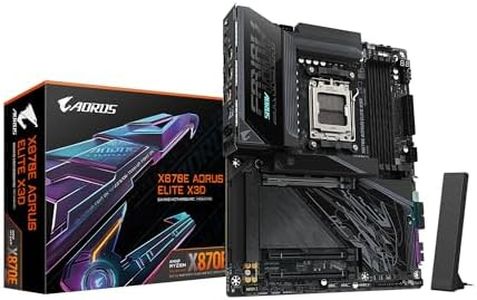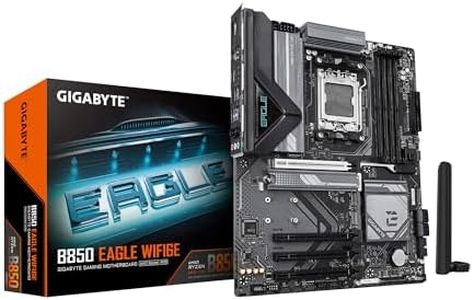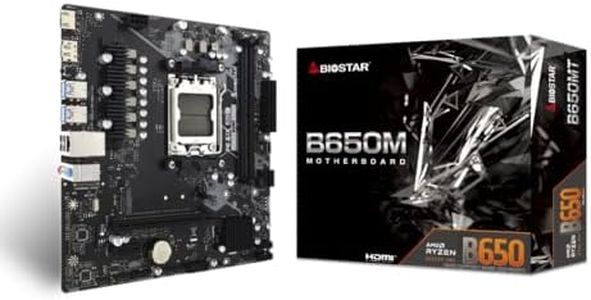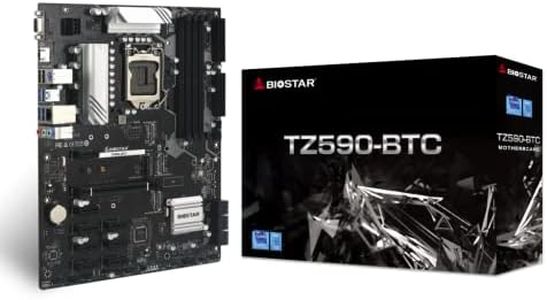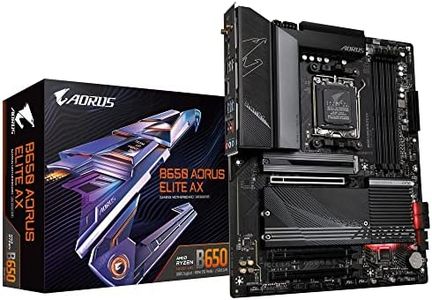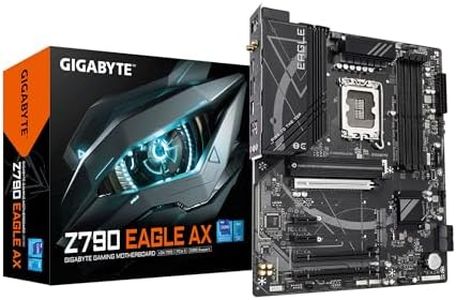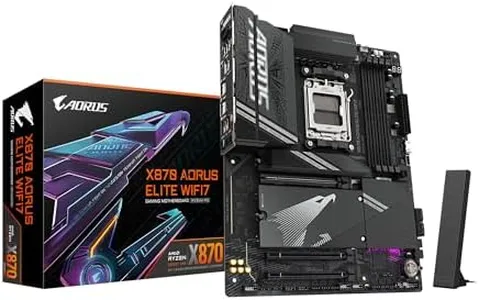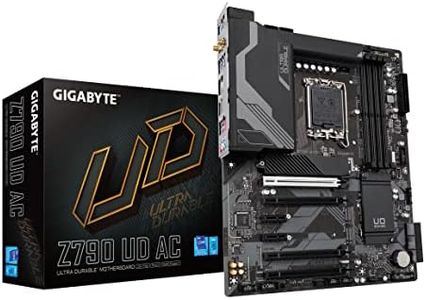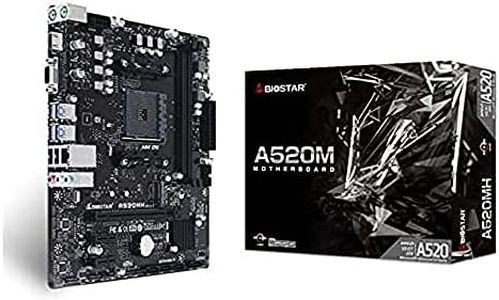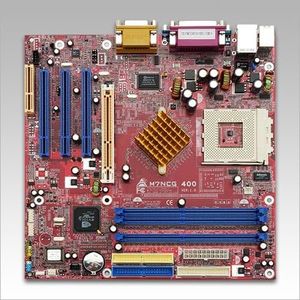10 Best Motherboards 2026 in the United States
Our technology thoroughly searches through the online shopping world, reviewing hundreds of sites. We then process and analyze this information, updating in real-time to bring you the latest top-rated products. This way, you always get the best and most current options available.

Our Top Picks
Winner
GIGABYTE X870E AORUS Elite WIFI7 AMD AM5 LGA 1718 Motherboard, ATX, DDR5, 4X M.2, PCIe 5.0, USB4, WIFI7, 2.5GbE LAN, EZ-Latch, 5-Year Warranty
Most important from
188 reviews
The GIGABYTE X870E AORUS Elite WIFI7 is a well-rounded ATX motherboard designed for AMD Ryzen 7000, 8000, and 9000 series processors, thanks to its AM5 socket. It supports the latest DDR5 memory, with four RAM slots capable of handling up to 256GB at speeds up to 5600 MHz, which is great for future-proofing your system. The board offers robust power delivery (16+2+2 phase design) and solid cooling features like VRM and M.2 Thermal Guards to help keep your components stable under heavy use.
For expansion and storage, you get four M.2 slots supporting fast NVMe drives, along with PCIe 5.0 compatibility, which means quicker data transfers and preparation for upcoming high-speed devices. Connectivity is impressive, including dual USB4 ports, front and rear USB-C, WiFi 7 for the latest wireless speeds, and a 2.5GbE LAN port for reliable wired networking. The EZ-Latch mechanism simplifies CPU installation, which is helpful for those building their own PC for the first time.
This motherboard is aimed at enthusiasts and those wanting the newest technology, so it could be more costly compared to mid-range boards. The matte black design gives it a sleek look, and the included 5-year warranty adds peace of mind. It suits gamers, content creators, and anyone looking to build a high-performance AMD system with cutting-edge features and future upgrade paths. Its strong specs and connectivity options make it a solid choice if you want a powerful and versatile base for your PC.
Most important from
188 reviews
GIGABYTE X870E AORUS PRO ICE AMD AM5 LGA 1718 Motherboard, ATX, DDR5, 4X M.2, PCIe 5.0, USB4, WIFI7, 2.5GbE LAN, EZ-Latch, 5-Year Warranty
Most important from
284 reviews
The GIGABYTE X870E AORUS PRO ICE is a solid ATX motherboard designed for AMD's latest Ryzen 7000, 8000, and 9000 series processors using the AM5 socket. It supports DDR5 RAM with four slots, allowing up to 256GB at speeds up to 5600 MHz, which is great for future-proofing and handling demanding tasks. The X870E chipset offers advanced features like PCIe 5.0, which ensures faster data transfer for new graphics cards and storage devices.
Regarding storage, it includes four M.2 slots for SSDs, providing plenty of fast storage options. Connectivity is strong with dual USB4 ports, front and rear USB-C, WiFi 7 for fast wireless networking, and a 2.5GbE LAN port, covering most modern needs. The board also features enhanced thermal controls for stability and an EZ-Latch design to make CPU installation easier.
This motherboard is positioned in a relatively high price range and, while it supports cutting-edge technology, it may exceed the needs of casual users. The BIOS/UEFI interface is powerful but might present a learning curve for beginners. It is well suited for gamers, content creators, and anyone looking to build a high-performance AMD system with future-ready connectivity and expansion options.
Most important from
284 reviews
Biostar MCP6PB M2+ DDR2 AM2+ NVIDIA GeForce 6150 / nforce430a MATX AMD Motherboard
Most important from
9 reviews
The Biostar MCP6PB M2+ is a micro ATX (MATX) motherboard designed for AMD processors using the Socket AM2+ and AM2, supporting a range of CPUs including AMD Phenom II, Athlon 64, and Sempron. It features the AMD 785E chipset paired with NVIDIA GeForce 6150 / nForce 430a, which was solid for its time, providing basic integrated graphics and chipset functions. You can install up to 4GB of DDR2 RAM across its slots, running at 800 MHz, which is quite limited by today's standards but was typical for motherboards released around 2004.
This board supports HyperTransport technology for faster communication between the CPU and other components, and it is recommended to use CPUs with a TDP of up to 95 watts. Expansion and storage options are basic, fitting smaller builds or budget setups, and connectivity is standard for older systems, without modern USB 3.0 or M.2 slots.
The BIOS/UEFI is traditional and simple, suitable for basic configuration but lacking advanced features found in newer boards. This motherboard is best suited for older AMD systems or users looking to maintain legacy hardware rather than building or upgrading a modern PC.
Most important from
9 reviews
Buying Guide for the Best Motherboards
Choosing the right motherboard is crucial for building a computer that meets your needs. The motherboard is the main circuit board that connects all the components of your computer, so it needs to be compatible with your other hardware and support the features you want. When selecting a motherboard, consider the type of processor you plan to use, the amount of memory you need, and the expansion options for future upgrades. Here are some key specifications to consider when choosing a motherboard.FAQ
Most Popular Categories Right Now
